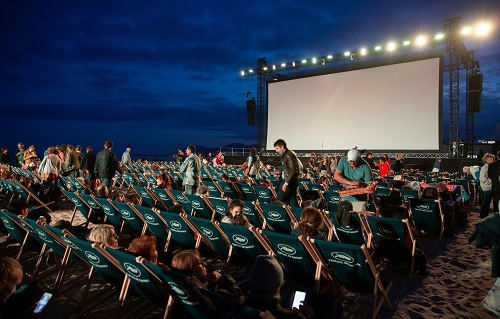Outdoor Movie Screening Business

Title of Business: Talent Show Organizer
Type: Service-based (Event Management)
Key Product/Services for Sale:
- Organizing and hosting talent shows (music, dance, comedy, magic, etc.)
- Event planning and coordination
- Talent scouting and recruitment
- Sponsorship and advertising opportunities for businesses
- Ticket sales and merchandising
- Training and workshops for aspiring talents
Technology Considerations:
Sound and lighting equipment for live events
Ticketing and registration software
Marketing and promotion through social media and online platforms
Live streaming equipment and software
Data management systems for participant and audience information
Market for the Product/Services:
Aspiring talents looking for a platform to showcase their skills
Schools and universities with talent programs
Corporate entities seeking entertainment for events
Local communities and cultural festivals
Media houses looking for content
Sponsorship partners and advertisers
Key Inputs into the Business:
Materials: Stage setup, sound and lighting equipment, promotional materials
Labor: Event managers, hosts, technical crew, marketing team
Equipment: Audio-visual equipment, stage, and seating arrangements
Suppliers: Equipment rental services, printing services for promotional materials
Product Preparation Process:
- Concept Development: Create a theme and structure for the talent show.
- Talent Recruitment: Conduct auditions and select participants.
- Venue Booking: Secure a suitable venue for the event.
- Sponsorship Acquisition: Approach businesses for sponsorship deals and advertising opportunities.
- Promotion and Marketing: Use social media, flyers, and traditional media to promote the event.
- Event Planning: Coordinate logistics, including stage setup, sound, lighting, and seating arrangements.
- Ticket Sales: Set up online and offline ticket sales channels.
- Event Execution: Host the talent show, manage the event flow, and ensure everything runs smoothly.
- Post-Event Activities: Follow up with participants, sponsors, and audiences for feedback.
Quality Considerations:
High-quality sound and lighting to enhance the audience experience.
Professional event planning and execution to ensure smooth operations.
Engaging and charismatic hosts to keep the audience entertained.
Fair and transparent judging criteria for talent performances.
Regular feedback collection to continuously improve future events.
Cost of Investment:
Sound and Lighting Equipment (rental): 50,000 KES per event
Venue Rental: 100,000 KES per event
Promotional Materials: 20,000 KES
Marketing and Advertising: 50,000 KES
Talent Recruitment and Auditions: 20,000 KES
Event Staff and Crew: 50,000 KES
Miscellaneous (licenses, permits): 20,000 KES
Total Estimated Cost per Event: 310,000 KES
Required Operational Infrastructure:
Office space for planning and coordination
Storage for equipment and materials
Reliable transportation for moving equipment and staff
High-speed internet for marketing, communication, and ticketing
Most Suitable or Viable Location of the Business:
Major urban centers with high population density include Nairobi, Mombasa, Kisumu, and Nakuru.
Areas with a vibrant cultural scene and regular events.
Proximity to schools, universities, and community centers.
Potential Sources of Investment Capital:
Personal savings
Family and friends
Small business loans or microfinance
Sponsorships from local businesses
Grants from arts and culture organizations
Crowdfunding platforms
Requirements for Effective Management:
Strong organizational and event management skills
Effective communication and negotiation skills for dealing with sponsors, participants, and vendors
Marketing and promotional skills to attract participants and audiences
Financial management skills to handle budgeting and expenses
Conflict resolution skills to manage any issues that arise during the event
Role of Mobile Phone and ICT in the Business:
Marketing through social media platforms (Facebook, Instagram, Twitter)
Client communication via WhatsApp, email, and phone calls
Online booking and ticketing systems
Live streaming of events to reach a wider audience
Data management for participant registration and feedback collection
Statutory Regulations and Licenses:
Business registration with the County Government
Event permits from local authorities
Compliance with copyright laws for music and performances
Public liability insurance for safety during events
Health and safety regulations for venue setup
Pricing:
Ticket sales: 500 – 1,500 KES per ticket
Sponsorship packages: 50,000 – 200,000 KES per sponsor
Advertising space: 10,000 – 50,000 KES per ad
Training and workshops: 5,000 – 10,000 KES per participant
Profitability:
Expected revenue per event (500 tickets @ 1,000 KES + 3 sponsors @ 100,000 KES + 10 ads @ 20,000 KES + 20 workshop participants @ 7,500 KES): 1,150,000 KES
Event expenses: 320,000 KES
Estimated profit per event: 830,000 KES
Break-even point: Approximately 1 event (based on initial investment and profitability estimates)
Next Steps to Take:
- Conduct Detailed Market Research: Identify target audiences, potential participants, and suitable venues.
- Create a Business Plan: Outline detailed marketing, operations, and finance strategies.
- Secure Funding: Apply for loans or seek investment from family and friends.
- Purchase or Rent Equipment: Start with essential items and gradually expand as the business grows.
- Develop Marketing Materials: Create a professional website, social media profiles, and promotional content.
- Launch and Promote Services: Network with event planners, promote through social media, and offer introductory discounts.
- Monitor and Improve: Collect feedback from clients and audiences, continuously update the music library, and improve service quality.

